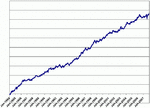There is nothing wrong with buying a system, as long you know what you are getting into and what to expect. We are talking about end of day systems only.
Checklist:
1. Is the system fully disclosed or a black box? Don't bother if it's a black box because you'll ditch it as soon as you hit a few losses.
2. Is it completely mechanical or does the seller claim to use his/her 'feel'? Don't bother if it's the latter. Assuming the seller has indeed developed a 'feel' of the market and is not lying, what makes you think you can develop that as well?
3. Ask the seller if he/she trades it everyday. Don't bother if they don't. If they trade it, for how long have they been trading it?
4. Ask where the seller's main income comes from: trading, selling courses, or some other source?
5. Ask if the seller will show you an audited account statement (hiding confidential information like their broker account number etc) over a period of 6 months, taken within the last year. Getting an account statement doesn't imply you are on to a winner, but it's better than none. This single question will weed out most of the scammers (except the serious crooks who happily falsify account statements).
6. If you have met the seller on a forum, ask for the names of a few other customers on the same forum, so you can contact them. Check when these members have joined the forum.
7. Find out what market it trades, using what vehicle, how often, which side (long, short, both), how much capital is needed to operate the system, how much time it needs every day, and (very important), if this is a one-sided system, i.e. trades only on the long or the short side then see what sort of market the system has had recently. In other words, long-only systems pop out of every corner in a roaring bull market, only never to be heard of again in a bear market. Don't get caught in th hype.
8. Get all the vital statistics, from real trades, not from simulated back tested results, both historical and for each year:
Number of winners v. losers
Average profit to average loss
Net ROE for each year
Compounded cumulative ROE since the beginning
Maximum historical drawdown
Maximum drawdown each year
Number of winning months v. losing months each year
9. Get the equity curve of the system (of real trades, not of simulated back tests).
10. Find out the conditions of refund. Most mechanical systems will have a 6-months or 1-year no-profit guarantee, i.e. if you follow the rules, log all your trades for that period and can't show a profit then you get your money back. This is why it's important not to buy a system based on the seller's 'feel'. You'll never get your money back.
If at any point of this questioning the seller gets a bit shirty and starts talking about 'trust' or 'honesty', simply walk away. If they cannot provide answers to straight question, they don't deserve your cash. There are plenty of fish in the pond.
Once you have done all the due diligence and are happy that you can handle the drawdown and the losses, go for it.
Once you start paper trading the system, chances are the system will go straight into a drawdown, completely against what the seller has told you so far. One thing you should never do is to give up at this stage and try something else. There are two reasons for this:
First, you never get your money back if you give up.
Second, the extended periods of drawdown are extremely useful to build you as a trader. What makes you think you'll not have a drawdown when you finally trade profitably? This tough period prepares you for that, so thank your stars that you are getting that opportunity before actually burning any real money. In addition, these losing periods tells you a lot about the system you are testing, why it is not performing, what is missing etc. All this information is useful. After all, it's not stopping you from trying to find your own system and paper trade it in parallel.

